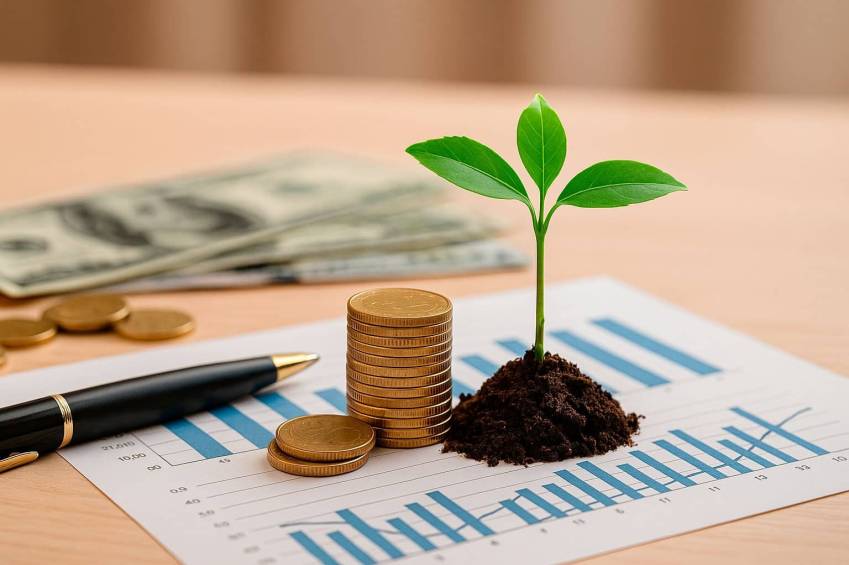
What is Seed Capital and How Can It Boost Your Business Idea?
The moment you decide to start your own business is, without doubt, one of the most exciting (and let’s be honest, stressful) times in your professional life. You’ve got an idea, a vision, maybe even a small team. But of course, without funding, even the best idea can stall. That’s where seed capital comes into play, that first spark that can ignite your project’s engine.
Today we’re going to talk with you, one-on-one, about this form of financing that has launched thousands of startups across the world. Is it right for you? How do you get it? What does it really mean to accept this type of investment? Let’s go step by step.
Meaning of Seed Capital: The First Stage of Funding for Entrepreneurs
Seed capital, also referred to as early-stage funding or seed funding, is the money that entrepreneurs or startup founders receive during the very first stages of their business. In other words, when there’s no revenue yet, no fully developed product, no loyal customers. Basically, when all you have is a great idea and a lot of drive.
This money is usually used to
-
Validate the business model
-
Develop a minimum viable product (MVP)
-
Run early market tests
-
Build a basic team
What’s interesting about this stage is that we’re not talking about traditional bank loans (which, by the way, often slam the door if you lack guarantees), but rather risk investment. That is, individuals or organisations who bet on you in exchange for a stake in your future company.
What is Seed Capital and Why is This Term Used in Startups?
You’ve probably come across the term seed capital more than once. It’s nothing more than the English version of "capital semilla", but with a strong link to the tech startup world.
The term has become so widespread that it’s used even in Spanish-speaking environments, especially when trying to attract international investors or venture capital funds that operate across borders. So if you see both terms, now you know – they’re the same thing.
And if you’re wondering why it’s called “seed”, well, it’s quite visual. Investing at this stage is like planting a seed in promising soil. A spectacular plant might grow… or nothing might sprout at all. But whoever puts the capital in is betting that you’ll make that business bloom.
Who Can Access Seed Capital and How to Get It
Here comes one of the big questions. Not everyone gets this kind of funding easily, that’s true. But it’s not just for elite circles either. In fact, access is becoming more and more democratic thanks to public programmes, accelerators and business angel networks.
Common Requirements to Obtain Early-Stage Financing
Although it varies depending on the investor, some typical criteria include
-
A clear, validated idea with strong potential
-
A committed and complementary team
-
Evidence of a real market need
-
A basic plan showing how you’ll use the funds
And of course, attitude. Because an entrepreneur who can communicate, inspire and show commitment is already halfway there.
Typical Sources of Investment: From Family to Specialised Funds
In Spain, some of the most common channels include
-
F&F (Friends and Family) – your first fans are often those closest to you
-
Business angels – private investors who back potential and talent
-
Incubators and accelerators – offering not only money but mentoring and networks
-
Public grants – ENISA, CDTI and others offer excellent soft loans
-
Crowdfunding platforms – like Startupxplore, The Crowd Angel or Crowdcube
Pro tip: Diversify. You can combine multiple sources. Sometimes, a little from each place adds up to much more than waiting for the “perfect” investor.
Pros and Cons of Seed Capital for Your Project
Nothing’s perfect, we know. So let’s go through the upsides and downsides.
Key Benefits for Early-Stage Entrepreneurs
-
Initial push without debt – you don’t have to repay the money if things don’t work out
-
Access to mentors and networks – many investors get involved and open doors
-
External validation – if someone bets on you, it’ll be easier to convince others
Risks and Commitments to Consider Before Accepting Investment
-
Loss of control – you’ll share decisions if you give away equity
-
Pressure for results – investors will expect fast progress
-
Future dilution – if you raise more rounds, your share might shrink
That said, if your vision is solid, this type of investment isn’t a burden. It’s a launchpad.
Differences Between Seed Capital and Other Investment Rounds
This is another important point. Not all money that comes into a startup is the same or serves the same purpose.
-
Seed capital – first phase, ideas under development, high risk
-
Series A – product in place, first clients, proven growth
-
Series B, C, etc. – focused on scaling up, expanding to new markets
So don’t confuse seed funding with traditional investment or later-stage rounds. They’re completely different leagues with very different rules. And of course, much higher expectations the further you go.
Conclusion: Is It Worth Seeking Seed Capital to Get Started?
The short answer is yes. But only if you know what you’re doing – and what you’re risking.
Seeking seed capital isn’t just about chasing money. It’s about finding the right travel companions, people who believe in your project as much as you do. And no, it’s not easy. But if you’ve got something truly valuable, someone will see it.
From our experience, we believe it’s a path that can make all the difference. It lets you start with more confidence, better tools and real support.
That said, do your homework, ask questions, compare options. And when the time comes, jump in with conviction.
Are you interested in exploring how to launch or sell your business in Spain with expert support? Then you can count on us. Find out more about how we can help you at Business in Spain.









